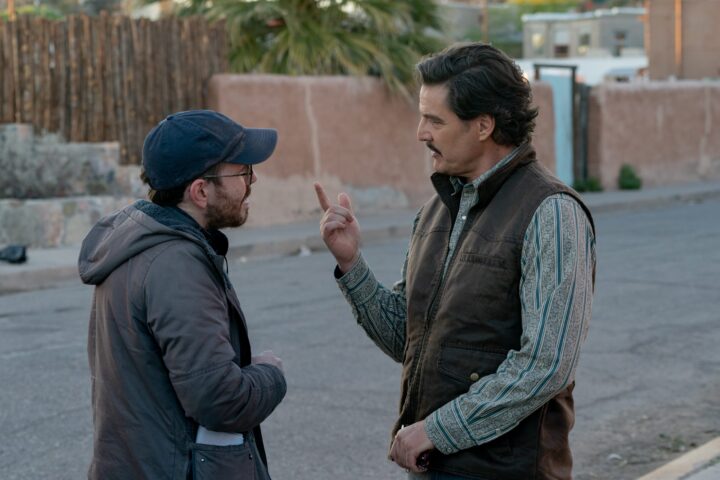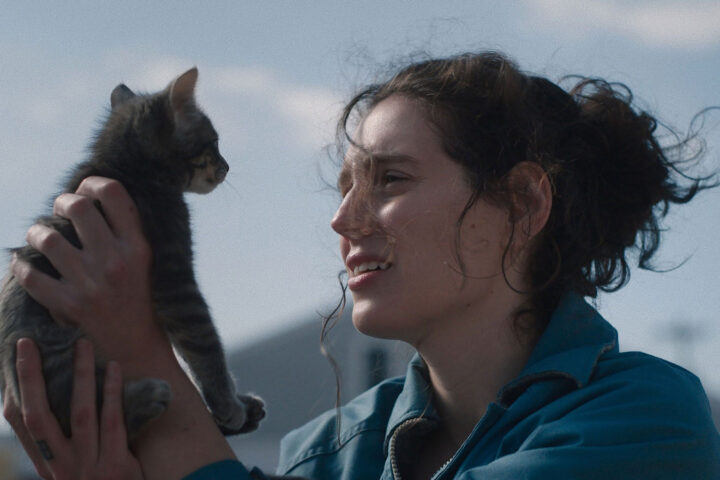In less than a decade, filmmaker Sean Baker has graduated from the micro-budget ranks of an iPhone-shot debut to capturing the coveted Palme d’Or at the world’s most prestigious film festival. Yet while his visibility (and likely opportunities) has grown exponentially, his lens remains resolutely the same, trained on the trials of lives on “the margins.” That Cannes winner, Anora, which in its best moments is an exhilarating swoon, is a modern Cinderella tale where cash is king (or at least a prince) and love comes at a high price for a work-a-day exotic dancer, played by a revelatory Mikey Madison, who falls into the orbit of a devil-may-care young customer. He happens to be loaded, charismatic and really into her.
The degree to which Anora sweeps you up—an experience I’m confident will be nearly inevitable—hinges significantly on Baker’s intoxicating opening act. We’re introduced to Ani (Mikey Madison), a gritty New York 23-year-old of Russian descent juggling the demands of a working-class life while living with her sister somewhere in Brighton Beach. Ani’s nights are spent in the neon-lit world of a splashy Manhattan strip club, where she rakes in cash performing both public and private dances.
Baker and cinematographer Drew Daniels bring this sleek environment to life with a vibrant mix of saturation and sensuality, camera gliding across the velvety alluring milieu, one charged with unpredictable situational dynamics between Ani, her boisterous (and competitive) fellow dancers and boss, and the men they entertain and rely upon as big spenders; the real fun is off-stage in watching Ani and company size up, and cozy up to, their frequently worshipful patrons.
Enter Ivan “Vanya” Zakharov (Mark Eydelshteyn), a wealthy, charismatic, twenty-one-year-old Russian playboy who becomes captivated by Ani. After a series of visits and paid dances he invites her to spend time with him beyond the club. For Ani, this begins as strictly business—she’s a working girl, and their arrangement is foremost transactional; a week with her comes at a steep price. Even as their connection deepens, and seemingly genuine feelings develop, the underlying financial dynamic remains in play.
Baker presents a wealth fantasy, lottery winner transport for Ani reminiscent of Garry Marshall’s Pretty Woman, albeit reimagined for a modern era, but with a twist: Ivan isn’t a disillusioned Prince Charming seeking redemption, but a reckless playboy, indulging his whims with a woman who’s street-smart yet limited in her broader worldview; their relationship is primarily carnal, humorously youthful and raucous, but we sense also real. She wants to trust him, and between the sheets she teaches him to hold an orgasm (the movie is gleefully ribald) and seems to turn his attention from wild parties and video games to something resembling a real connection.

This first third, as exciting as anything in a film this year, had me in happy tears by the hour point, at which the energetic young couple elopes in Vegas—he needs a green card and she thinks, we think, that no one has ever seen her this way prior—and their rush to the altar, both visually and sonically, is near the best in an American movie this year. The intense, dizzying euphoria of this sequence, set to an absolutely transporting and inspired music cut—Greatest Day (Calum Scott and Take That remixed by DJ Robin Schulz)—was, for this critic, the year’s most soaring.
But does what goes up really have to come down? Bliss is short-lived once Vanya’s American babysitter, a harried and hot-tempered Armenian gatekeeper named Toros (the marvelous Karren Karagulian), in the employ of his billionaire oligarch parents and responsible for keeping their son straight, hears rumor of the matrimonial impetuousness and is swiftly ordered to have the vows annulled.
At this point the film swerves into its tone-shifting second act, becoming a sort of screwball road movie after Vanya drunkenly goes into hiding, leaving Ani to the wolves—Toros and henchmen Garnick (Vache Tovmasyn) and Igor (Yuriy Borisov), both of whom are comically ill-suited for the job. Baker takes the wind out of abandoned Ani’s (and our) sails as she navigates brutality, coercion and the flunkies’ inept pursuit around the outer boroughs, the romanticism of the picture’s first act replaced with a sobering reality. This reality is plausible but it does give the film a whiplash unevenness that temporarily strains our investment.
This reality sweeps Ani and the unlikely crew into an all-night, After Hours-style odyssey, hopping from restaurant to bar to street corner to boardwalk—a journey as bewildering for Ani as it is for us. Nonetheless, Baker has expertly choreographed this night, punctuating it with enjoyable moments (Toros lecturing a table of young diners on “today’s attitudes” is a personal favorite). As Ani clings to the hope that Vanya will swoop in and fix everything (his phone is conveniently off, naturally), it begins to feel more like a fantasy of misplaced loyalty than any real possibility.
By the time Vanya’s perturbed, imperious parents (Daria Akamasova, Aleksey Serebryakov) step off their private jet to set things right, Baker’s eyes are fully open—and so are Ani’s. She’s confronted with a truth she’s maybe known deep down: love, kindness and integrity are outmatched by the ruthless dynamics of capitalism and power. In the film’s extraordinary final exchange, Madison delivers a gut-wrenching blow, revealing the cost of Ani’s hard-learned lessons, a world away from the nightly illusions she puts on so effortlessly at work.
Mikey Madison, who stole scenes in Once Upon a Time in Hollywood (meeting a fiery end) and in 2022’s Scream (another tragic close), is a bona fide star, commanding every frame in Baker’s world. Her Ani may think she’s mastered the art of trading charm for tips, but even a (possible) heart of gold can’t be patched up with all the cash in the world. Madison navigates this fallout with a mix of raw vulnerability and defiance, leaving us with the painful truth of Ani’s experience—what was once exhilarating has spiraled into something far messier.
And the exuberant Eydelshteyn is a terrific Vanya, a juvenile with dress up sophistication, a kid in a candy store playing around with big money and bigger stakes. Whether the film treats Vanya fairly is another question, as is whether Baker fully justifies Vanya’s abrupt turn at the midpoint. In the film’s second half, Vanya’s character feels underserved, leaving us waiting for a deeper insights. When Baker finally stages a late exchange it falls short; what was once a dynamic young man is reduced to a thematic device, his long-delayed reaction insufficient.
As a storyteller Baker is an amalgam of social observer and lyrical optimist, a reluctant realist who knows that the dreams of ordinary people frequently come crashing down to Earth. That gives his movies a very uniquely straddled world view, one of fleeting elation upended by the cold light of day; he sees this paradox clearly and knows the price of rose-tinted glasses. While 2015’s Tangerine was his scrappiest and 2021’s Red Rocket his least interesting, his best film is still 2017’s The Florida Project, in which a community of post-recession Floridians—parents, children, unlikely friends—permanently residing in a motel close to Disneyworld try to make ends meet. In that picture, actress Bria Vinaite played a single mom who turned occasional tricks to support her daughter, and in the picture’s closing moments conveyed a clear understanding of a painful reality. The same sort of unwanted reckoning informs the final moments of Anora, a film that takes you very high, then very low; it’s both storybook wish fulfillment and a lesson that I didn’t want to learn.
3 stars



